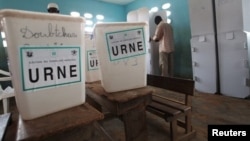ABIDJAN —
Tension is flaring in parts of Abidjan as results trickle in from Ivory Coast’s first local elections in more than a decade. So far, independent candidates have taken more seats than either of the two main political parties that participated — a trend that could signal disenchantment with the ruling coalition.
Both the campaign and Sunday’s vote were conducted peacefully. But for the past two nights in the commercial capital, Abidjan, security forces have broken up demonstrations organized by the supporters of losing candidates, resulting in an unknown number of injuries.
Security forces in Abidjan’s Adjame district used tear gas on demonstrators late Tuesday. Witnesses said at least 100 supporters of Soumahoro Farikou, an independent candidate, took to the streets after the electoral commission announced he had lost a municipal race to the candidate from President Alassane Ouattara’s Rally of the Republicans (RDR) political party.
A 28-year-old clothing vendor, Seydou Konate, said he saw security forces beat demonstrators with batons and wood. He said voters here did not trust the official result and would never accept it.
“Ouattara’s party did not win here, and everyone knows it," he said. "The government is trying to steal the vote, and that is unacceptable.”
Similar demonstrations were also reported in Abidjan’s Koumassi district, although those involved supporters of a losing RDR candidate. On Monday, demonstrations took place in Adjame, Koumassi and in Yamoussoukro, the political capital in the center of the country.
Ivorian officials have been reluctant to comment on the unrest, but reports from witnesses and local officials suggest dozens have been injured.
Ivory Coast has a history of election-related violence. After the November 2010 presidential runoff vote, former president Laurent Gbagbo refused to concede defeat to Ouattara, prompting a five-month power struggle that claimed an estimated least 3,000 lives.
Gbagbo’s Ivorian Popular Front (FPI) political party boycotted this week’s vote, which is the first one carried out solely by the government since the crisis. The party also boycotted a 2011 legislative vote that was partly organized and certified by the U.N.
With the FPI out of the picture, Sunday's race was seen as a contest between the RDR and the Democratic Party of Ivory Coast, the most important member of Ouattara’s governing coalition.
But with more than half of the municipal positions announced by Wednesday, independent candidates had won more seats than either of those two parties.
Landry Kuyo, secretary general of My Way Network, a youth organization that promotes political participation, says this indicates the population is tired of the main political parties and is casting votes with development in mind.
“The population does not have confidence in the political parties. They want to hear from candidates who will develop their neighborhoods, not from politicians," he said. "That is why the independent candidates appeal to them, and why they did so well despite the political parties’ financial resources and support bases.”
More results from the race were expected by early Thursday.
Both the campaign and Sunday’s vote were conducted peacefully. But for the past two nights in the commercial capital, Abidjan, security forces have broken up demonstrations organized by the supporters of losing candidates, resulting in an unknown number of injuries.
Security forces in Abidjan’s Adjame district used tear gas on demonstrators late Tuesday. Witnesses said at least 100 supporters of Soumahoro Farikou, an independent candidate, took to the streets after the electoral commission announced he had lost a municipal race to the candidate from President Alassane Ouattara’s Rally of the Republicans (RDR) political party.
A 28-year-old clothing vendor, Seydou Konate, said he saw security forces beat demonstrators with batons and wood. He said voters here did not trust the official result and would never accept it.
“Ouattara’s party did not win here, and everyone knows it," he said. "The government is trying to steal the vote, and that is unacceptable.”
Similar demonstrations were also reported in Abidjan’s Koumassi district, although those involved supporters of a losing RDR candidate. On Monday, demonstrations took place in Adjame, Koumassi and in Yamoussoukro, the political capital in the center of the country.
Ivorian officials have been reluctant to comment on the unrest, but reports from witnesses and local officials suggest dozens have been injured.
Ivory Coast has a history of election-related violence. After the November 2010 presidential runoff vote, former president Laurent Gbagbo refused to concede defeat to Ouattara, prompting a five-month power struggle that claimed an estimated least 3,000 lives.
Gbagbo’s Ivorian Popular Front (FPI) political party boycotted this week’s vote, which is the first one carried out solely by the government since the crisis. The party also boycotted a 2011 legislative vote that was partly organized and certified by the U.N.
With the FPI out of the picture, Sunday's race was seen as a contest between the RDR and the Democratic Party of Ivory Coast, the most important member of Ouattara’s governing coalition.
But with more than half of the municipal positions announced by Wednesday, independent candidates had won more seats than either of those two parties.
Landry Kuyo, secretary general of My Way Network, a youth organization that promotes political participation, says this indicates the population is tired of the main political parties and is casting votes with development in mind.
“The population does not have confidence in the political parties. They want to hear from candidates who will develop their neighborhoods, not from politicians," he said. "That is why the independent candidates appeal to them, and why they did so well despite the political parties’ financial resources and support bases.”
More results from the race were expected by early Thursday.
